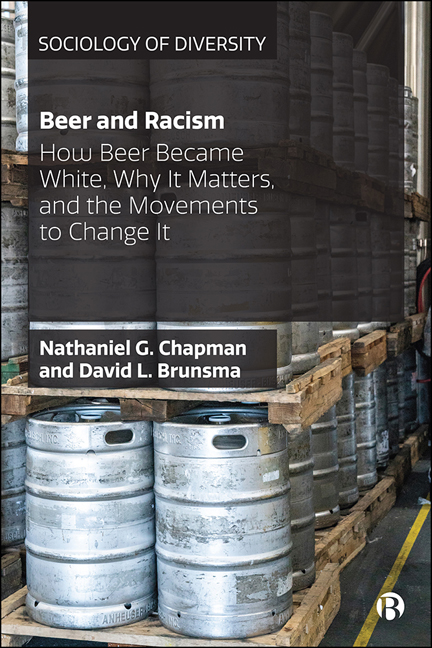Book contents
- Frontmatter
- Dedication
- Contents
- About the Authors
- Acknowledgments
- Foreword
- Series Editor Preface
- 1 Brewing Up Race
- 2 Racism, Brewing, and Drinking in US History
- 3 The Making of the (White) Craft Beer Industry
- 4 The Paths to Becoming a Craft Brewer and Craft Beer Consumer
- 5 Exposure, Marketing, and Access: Malt Liquor and the Racialization of Taste
- 6 Gentrification and the Making of Craft Beer White Spaces
- 7 #WeAreCraftBeer: Contemporary Movements to Change the Whiteness of Craft Beer
- Appendix A Respondents to the Semi-Structured Interviews
- Appendix B Interview Protocol
- References
- Index
2 - Racism, Brewing, and Drinking in US History
Published online by Cambridge University Press: 25 February 2021
- Frontmatter
- Dedication
- Contents
- About the Authors
- Acknowledgments
- Foreword
- Series Editor Preface
- 1 Brewing Up Race
- 2 Racism, Brewing, and Drinking in US History
- 3 The Making of the (White) Craft Beer Industry
- 4 The Paths to Becoming a Craft Brewer and Craft Beer Consumer
- 5 Exposure, Marketing, and Access: Malt Liquor and the Racialization of Taste
- 6 Gentrification and the Making of Craft Beer White Spaces
- 7 #WeAreCraftBeer: Contemporary Movements to Change the Whiteness of Craft Beer
- Appendix A Respondents to the Semi-Structured Interviews
- Appendix B Interview Protocol
- References
- Index
Summary
‘I think the innovation behind those 19th-century beer makers is really unparalleled. These were some serious entrepreneurs. And that's what I think I’m the most proud to learn about and to read about. The disappointing part is that that is our country's history. That's the reality of it. In the 19th century, we had the same anti-immigrant sentiments that, sadly, we have today. We have a lot of poverty; there are different socio-economic aspects and social issues that we encounter. The fact that I couldn't just walk into a bar in 1890 devastates me, but it was a different time, of course.
I think it's all just sort of congruent with other things that we see in history.’ (Karina, Latinx, female, curator/ insider) ‘I can't really count the number of brewers who got in touch with me [after my talk], and said, “Oh, my gosh, I’ve never thought about this.” That there might have been a history of brewing that doesn't look like what they see every day. And because I think for some of us, it's so evident. How do you not think about it? But I think a lot of people just don’t.’ (Patricia, black, female, industry insider)
American (beer’s) origin stories and the making of the American (beer)
The search for the origins of beer and brewing in what would become the US has been hampered by the realities of the racial, gendered, and classed inequalities that created the US in the first place. A look at the classics of US beer history (for example, Baron,1962; Downard, 1980), as well as more contemporary restatements of said creation myths (for example, Acitelli, 2013; Erickson, 1987; Hindy, 2014; Mittleman, 2008; Ogle, 2006), the influential writings of renowned beer traveler and writer Michael Jackson (for example, his three volume World Guide to Beer, 1977, 1991, and 1997), and the renowned work of Charlie Papazian, highlights a story that focuses on similar places, similar names, and similar processes, and makes similar arguments. Such books build on each other, though largely only by adding the stories of the next generation of white men, whose activities both continue the white paths laid down in a society designed to support such trajectories and, in the process, solidify the white mythology of beer and brewing, erasing the experiences of women, the poor, and racialized minorities.
- Type
- Chapter
- Information
- Beer and RacismHow Beer Became White, Why It Matters, and the Movements to Change It, pp. 27 - 48Publisher: Bristol University PressPrint publication year: 2020



